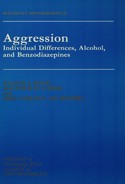0%
19Chapters
0-1Hours read
0kTotal Words
Book Description
The incidence of aggression and violence is of wide concern. It is therefore vital that we try to understand the mechanisms involved. This book outlines definitions and theories of aggressive behaviour and points out the contribution of both biological and psychological factors. Aggression primarily occurs within an interpersonal exchange and is often accompanied by increased arousal and negative feelings. It is most likely to occur in response to provocation but individuals differ in what they consider constitutes provocation. Aggressive behaviour is both multicausal and multifaceted but in order to study it, we have to break it down into components and find ways in which to measure these.This book describes a body of research examining the conditions under which the behavioural, affective and physiological components of aggression are elicited. A specific experimental technique which measures behavioural aggression in the laboratory is described. The task was found to be sensitive to individual differences in aggressive disposition. Aggression is not, however, confined to a small group of extremely hostile individuals. Alcohol or substance abuse is often associated with aggression in the general population. The results of some studies examining the effects of alcohol and benzodiazepines on the feelings and behaviour of healthy volunteers are reported. The way in which people appraise a situation influences the way they feel and behave. These drugs, therefore, impair the ability to process socially relevant information which, in turn, lowers the threshold at which aggressive behaviour is likely to occur. It is only by continuing to study the complex interaction between pharmacological and psychological factors that we will gain more insight into the processes underlying aggressive behaviour.
Table of Contents
- Front Cover
- Half Title
- MAUDSLEY MONOGRAPHS
- Title Page
- Copyright
- Contents
- Acknowledgements
- Preface
- 1. The psychology of aggression
- 2. The psychopharmacology of aggression
- 3. Methods: General approaches and experimental techniques
- 4. Behavioural aggression in a clinical group
- 5. The effects of alcohol on behavioural aggression
- 6. The effects of benzodiazepines on behavioural aggression
- 7. The effects of alprazolam on behavioural aggression
- 8. General discussion and conclusions
- References
- Author index
- Subject index
